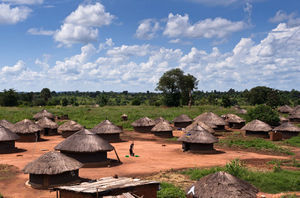The Conrad N. Hilton Foundation awarded a $445,000 grant to Blue Planet Network, who will lead a global partnership between Notre Dame Initiative for Global Development (NDIGD), Africa Ahead, and the International Lifeline Fund to implement the Clean Cook Stoves for Health (CCSH) project in Uganda. NDIGD will serve as the lead research partner for the CCSH project, and will monitor and evaluate the community health impact of replacing traditional cook stoves with energy-efficient models in over 3,000 households in 35 northern Ugandan villages.
Acute respiratory disease is a leading cause of morbidity in Uganda and causes more than 8% of infant deaths. Nearly 95% of rural households cook on open fires, resulting in one-third of Uganda’s forest lost in the last 25 years and explaining the high rate of acute respiratory disease, typically in women and girls. Traditional cook stove smoke may contribute to many chronic illnesses and acute health impacts such as early childhood pneumonia, emphysema, cataracts, lung cancer, bronchitis, cardiovascular disease, and low birth weight.

The CCSH project will replace the traditional cook stove with an improved cook stove that is expected to have significant impact on health and the environment. NDIGD’s role in this project is to perform rigorous evaluation using household surveys in 70 villages in Uganda before, during, and after project implementation.
CCSH is part of a larger H20 Health Plus (H20+) initiative, a three-to-five year project that also includes the provision of sustainable safe drinking water and sanitation, and women-led leadership development for rural villages throughout districts in northern Uganda. H20+, led by Blue Planet Network, is demonstrating the unique power of sustainable safe drinking water, use of clean cook stoves, and better hygiene and sanitation practices to provide measurable improvements in health, health clinic capacity, economic vitality, and increased school enrollment of girls.
The Notre Dame team includes Dr. Fang Liu, Huisking Foundation, Inc. Assistant Professor in the Department of Applied and Computational Mathematics and Statistics; information technology product expert Tom Marentette; and Dr. Juan Carlos Guzman and Dr. Lila Khatiwada, NDIGD monitoring and evaluation specialists.
“This three-year evaluation will provide an opportunity to use a statistically rigorous approach in assessing the long-term impact of efficient cook stoves in natural settings,” says Dr. Liu.
The Conrad N. Hilton Foundation was created in 1944 by international business pioneer Conrad N. Hilton, who founded Hilton Hotels and left his fortune to help the world’s disadvantaged and vulnerable people. The Foundation currently conducts strategic initiatives in six priority areas: providing safe water, ending chronic homelessness, preventing substance abuse, helping children affected by HIV and AIDS, supporting transition-age youth in foster care, and extending Conrad Hilton’s support for the work of Catholic Sisters. In addition, following selection by an independent international jury, the Foundation annually awards the $1.5 million Conrad N. Hilton Humanitarian Prize to a nonprofit organization doing extraordinary work to reduce human suffering. From its inception, the Foundation has awarded more than $1 billion in grants, distributing $92 million in the U.S. and around the world in 2013. The Foundation’s current assets are approximately $2.4 billion.
Blue Planet Network, a division of East Meets West, connects funders, NGOs, the public and communities in need to improve the planning, selection, management and monitoring of water and sanitation programs. The International Lifeline Fund’s mission is to bring clean water and fuel-efficient stoves to displaced and impoverished communities in Sub-Saharan Africa and Haiti.
Contact: Joya Helmuth, NDIGD Outreach Associate, jhelmuth@nd.edu